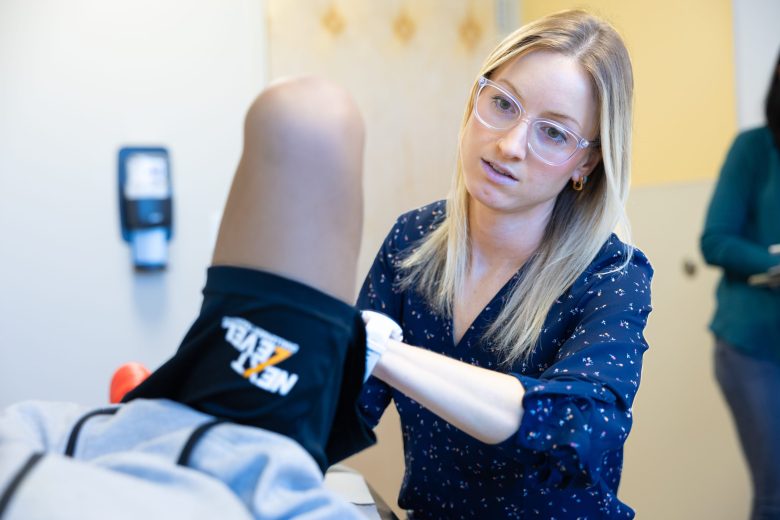Three years ago, Nevaeh Zamora was running cross country as a high school freshman at Pinnacle Charter School in Thornton when her body gave out. Malnourished and overtrained, she tore her hip flexor, an injury that sidelined her and forced her to reevaluate everything she thought she knew about fueling her body.
“I went to eating only one meal a day because I thought, ‘Oh, the smaller runners are the fittest and the fastest, and that’s going to get me to that next point.’ And it ended up just running me to injury,” Zamora said.
That injury ultimately led her to the Female Athlete Program at Children’s Hospital Colorado, where she worked with sports medicine specialists, a nutritionist and a physical therapist to heal physically and mentally.
“Without the Female Athlete Clinic, I would not be where I am today,” Zamora said. “They definitely took the narrative that food was bad and shifted that completely. Without them, I don’t think I’d be graduating this year.”
Now, the Sports Medicine Center at Children’s Hospital Colorado is home to a first-of-its-kind resource for young female athletes. Launched last fall, the Female Athlete Program takes a comprehensive, multidisciplinary approach to athlete health, one that goes beyond injury treatment to address nutrition, menstrual health, and long-term wellness.
Aubrey Armento, a pediatric sports medicine doctor, marathon runner and advocate for young female athletes, leads the program.
Armento said she battled with underfueling and missed periods during high school and college, giving her firsthand insight into how these challenges affect performance and long-term health. As a result, she created a specialized program that not only treats female athletes but also helps prevent these issues before they start.
“We bring together a sports dietitian and an adolescent gynecologist, which many programs don’t have because we know female athlete health isn’t just about one issue,” Armento said.
According to her, one of the most significant risks for female athletes is low energy availability, which refers to a mismatch between how much energy an athlete burns and how much she consumes.
“If an athlete doesn’t have enough energy to support normal body functioning, it can lead to what’s called the female athlete triad, “ Armento said. “So in response to that, we can see an athlete lose their period, have infrequent periods or delayed starts of their period.”
Armento emphasized the long-term risks of these issues, particularly for bone health.
“So we know that if somebody is not optimizing their bone health during adolescence in particular, which is when a large proportion of the bone mass that we have into our adult life is gained, we’re basically setting these athletes up for increased risk for osteoporosis,” she said.
She explained that warning signs can range from frequent injuries and slow recovery times to more subtle cues like avoiding team meals or engaging in restrictive eating patterns.
One challenge Armento sees regularly is the impact of social media on young athletes’ eating habits.
“Unfortunately, we see a lot of young people who may start to engage in bad diets that they see on TikTok, for example.”
Restrictive eating habits can worsen energy imbalances, leading to more injuries and long-term health consequences, which is why the program includes a nutrition consultation with a registered sports dietician and individualized nutrition goals.
Shifting the narrative around female athlete health
Beyond patient care, Armento said the Female Athlete Program aims to raise awareness about the risks associated with the female athlete triad.
“Our big goal is to be a resource in the Colorado area,” Armento said. “So for these young female athletes who may be struggling with body image, proper fueling or slow recovery, they know they can come to the Female Athlete Program at Children’s and get high quality, comprehensive care.”
Armento has found encouragement in the increased visibility of elite athletes discussing these issues.
“I’ve been really happy to see high-profile athletes that have a platform use their platform in a positive way to try to promote healthy relationships with food and different body types and exercise,” she said.
Zamora is now using her experience to help other athletes. For her senior capstone project, she created a workshop for freshmen at her school about food positivity and the impact of diet culture on young athletes.
“I told them, ‘If you ever need an excuse to eat ice cream, I’m your excuse. Eat the ice cream because life’s too short,’” Zamora said. “It’s not that I run so I get to eat. I eat so I get to run.”
Armento urged athletes to reach out early if they are struggling.
“My biggest piece of advice is not to be scared to speak up and let somebody know that you’re having a hard time because there (are) many resources in place to help provide support. And I think the sooner the better,” she said.
She also reminds athletes that they are not alone in this.
“There are sports dietitians that work virtually and can see patients all over the country,” she said.
Zamora, now preparing for college, said the program helped her build a healthy relationship with food that will serve her for years to come.
“I can say with full confidence that I trust that I’m going to eat, and my mom trusts that I’m going to eat,” she said. “Without that program, I wouldn’t be able to move in this direction.”
Armento hopes the program will become a key resource for young female athletes across the region.
“Ultimately, our goal is to help athletes build healthy relationships with food, their body and exercise that will carry them into their adult lives, so they can continue to be active and participate in the sports they love for many, many years,” she said.

